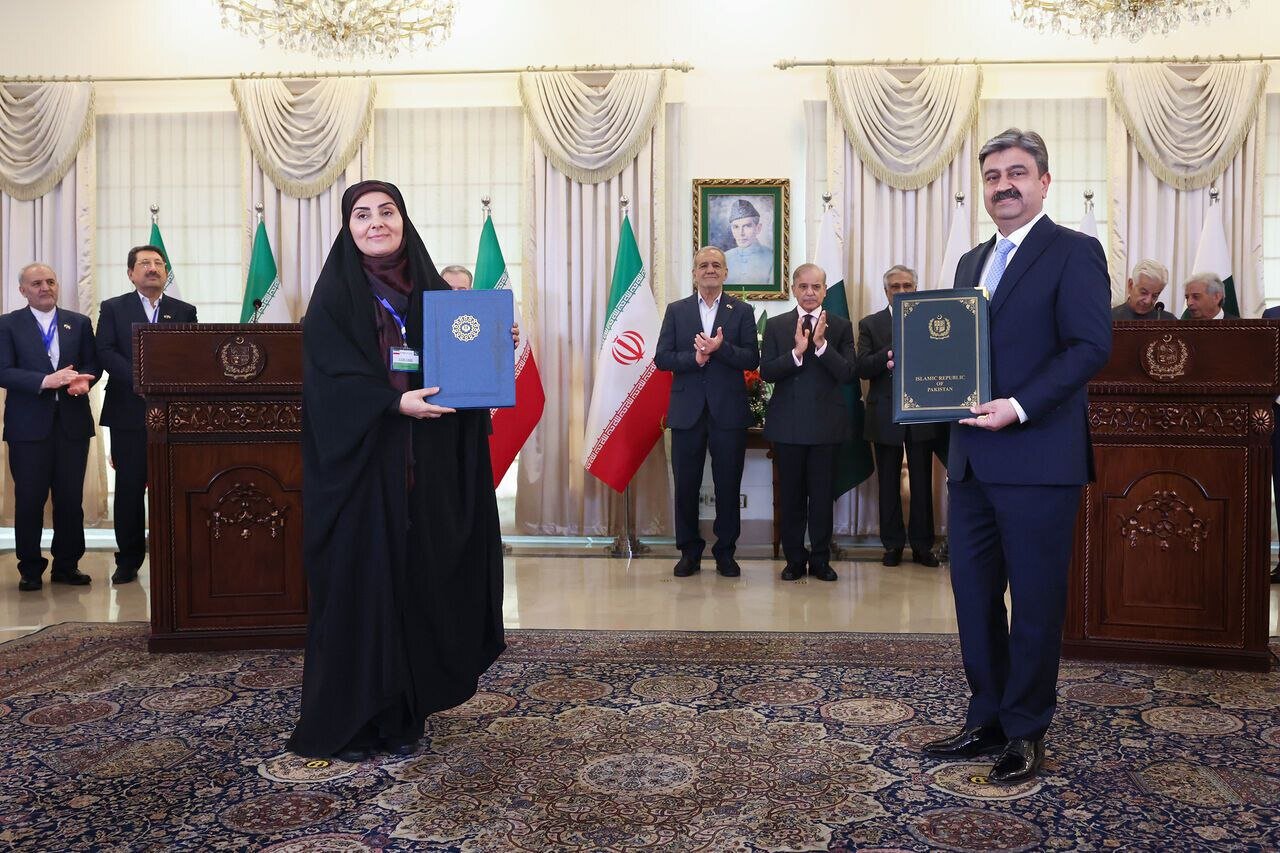Tehran, Islamabad to develop ties on meteorology

TEHRAN – Meteorological organizations of Iran and Pakistan have signed a memorandum of understanding (MOU) to promote cooperation on meteorology, atmospheric science, and hazards.
The MOU was signed on the sidelines of President Masoud Pezeshkian’s official trip to Pakistan.
The two countries are affected by the same natural hazards and climate change threats, such as tropical cyclones, monsoon rains, and resulting floods, drought, sand and dust storms, as well as air pollution, IRNA reported.
The signed MOU will open up a new chapter to jointly address common climatic hazards and will facilitate crisis management.
Expansion of regional and global interactions is one of the main policies of Iran’s Meteorological Organization to reduce hazards, particularly those caused by climate change.
The policy has also led the Organization to establish two regional offices with transnational missions in the fields of ‘specialized meteorological trainings’ and ‘climate’ to provide regional and international services.
Also, the Economic Cooperation Organization (ECO) Regional Center for Risk Management of Natural Disasters, known as ECO-RCRM, has been established in the city of Mashhad with the support of the Iran Meteorological Organization to actively cooperate in reducing the risks associated with weather-related disasters.
Joint efforts to boost climate change resilience
The international project of managing natural disasters and enhancing resilience to climate change impacts was inaugurated officially by representatives from the Department of Environment (DOE), the Embassy of Japan, and the United Nations Educational, Scientific, and Cultural Organization (UNESCO).
Funded by Japan, the project’s document was signed on April 12 by Ieng Srong, the head of the UNESCO Tehran Office, and Arman Khorsand, the head of the international affairs and conventions office of the DOE.
The main objectives of the project include developing flood hazard maps, establishing early warning systems, assessing and managing agricultural drought risk, and empowering local communities, particularly women and youth, to effectively prepare them to respond to disasters and crises, the DOE website reported.
The project also aims to develop scientific and technical infrastructure in crisis management with the prospect of becoming a regional model for combating climate change effects.
Referring to the challenges of climate change, Shina Ansari, head of DOE, highlighted the significance of public participation, indigenous knowledge, and modern technologies in disaster risk reduction.
The head of the UNESCO Tehran Office, Ieng Srong, for his part, lauded environmental cooperation between the two organizations and underscored the importance of prioritizing science and raising awareness in the fight against climate change.
Sanctions undermine climate cooperation
Addressing the 17th BRICS Summit Session on “Environment, COP 30 and Global Health, held in Brazil on July 7, Iranian Foreign Minister Seyed Abbas Araqchi said that sanctions and geopolitical tensions undermine climate cooperation and hinder coordinated action.
“Climate change is no longer just a threat to the future but a current reality whose effects are increasingly being felt every day.
Rising temperatures, water scarcity, widespread wildfires, destruction of ecosystems, and climate-induced migrations have become the lived reality of millions,” the Ministry of Foreign Affairs website quoted Araqchi as saying.
Underlining the crucial role of BRICS as a symbol of South-South cooperation and the independent voice of nations, Araqchi said, “Today, humanity faces a series of interconnected crises, from the profound impacts of climate change and environmental degradation to increasing threats to global health, and ultimately the unjust structures that hinder the progress of developing countries”.
The official then spoke about Iran’s position in a climate-vulnerable region, saying, “We have implemented domestic programs focused on water resource management, renewable energy development, and restoration of native ecosystems”.
The top Iranian diplomat stressed that an effective climate crisis response requires climate justice, acknowledging the historical responsibility of developed countries for environmental destruction and their vital role in providing financial resources and transferring clean technologies to developing nations.
Meanwhile, Araqchi voiced concern over the failure of industrialized and developed governments to fulfill their commitments, attributing a large share of global environmental challenges, such as greenhouse gas accumulation, global warming, and various pollution, to actions by developed countries.
He noted that these countries must not only lead in reducing emissions and combating pollution but also, given their historical responsibility, provide financial resources, technical assistance, and environmentally compatible technologies to compensate for damages inflicted on developing countries.
The foreign minister pointed out that sanctions and geopolitical tensions undermine climate cooperation and hinder coordinated action.
“Unjust sanctions and unilateral coercive measures imposed by some developed countries on developing nations, including the Islamic Republic of Iran, under political pretexts, pose serious obstacles to these countries’ efforts,” said Araqchi.
He went on to note that this contradicts the global community’s goals for joint action against the harmful effects of climate change and achieving sustainable development goals, especially poverty and hunger eradication.
MT/MG
Leave a Comment